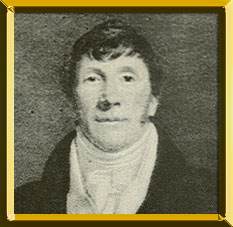
Winning England’s prize ring championship in the third and final fight of his sparse career, John Jackson exemplified the “gentleman boxer.” The son of a builder, Jackson was of a higher socioeconomic status than his predecessors and he hobnobbed successfully with the nobility. He dressed well and behaved in a polite manner, and so brought an often-missing gentility to the sport.
A great athlete, Jackson was also an accomplished sprinter and long jumper. He first fought professionally in 1788 when he defeated the more experienced and previously unbeaten William Fewterel. Jackson proved himself to be a fine two-handed puncher, using his left more than most fighters of his time. Jackson next fought George Ingelston. Jackson won the first two rounds, but in the third, as he was attempting to finish Ingelston, Jackson skidded on the slippery ring surface. Historians disagree as to whether Jackson turned his ankle or broke his leg, but in any case, he was down, and Ingelston was declared the winner.
The loss stung Jackson badly and he retired from the ring, having only fought twice. Not until six years later, in 1795, did the chance to fight the highly skilled Daniel Mendoza for the title finally motivate Jackson to return. Jackson scored an easy victory in nine rounds totaling eleven minutes, although he prevailed through the use of a questionable tactic. Jackson grabbed Mendoza’s long hair with one hand. With Mendoza held before him, Jackson slugged him mercilessly with his free hand. This maneuver was not against the rules of the time, and Jackson won the fight without penalty.
Content in the knowledge that he had at last won the title, Jackson retired again. He turned his attention to operating his London boxing academy, where he instructed many members of the nobility, including Lord Byron. Jackson encouraged fighters at his academy to use “mufflers,” the hand covering that Hall of Famer Jack Broughton invented for training and sparring.
During King George IV’s coronation, Jackson was recruited to assemble guards to keep order. He assembled a complement of eighteen prizefighters. A popular sports celebrity of his day, Jackson was a favorite of the more common people as well as the aristocrats. He died at the age of 76, and at his grave, a statue of a crouching lion was erected to symbolize his great skill and strength.
* * *
Excerpted with permission from 'The Boxing Register' by James B. Roberts and Alexander G. Skutt, copyright © 1999 by McBooks Press. All rights reserved.
Born: Sept. 25, 1769
Died: Oct. 7, 1845
Induction: 1992
John Jackson
